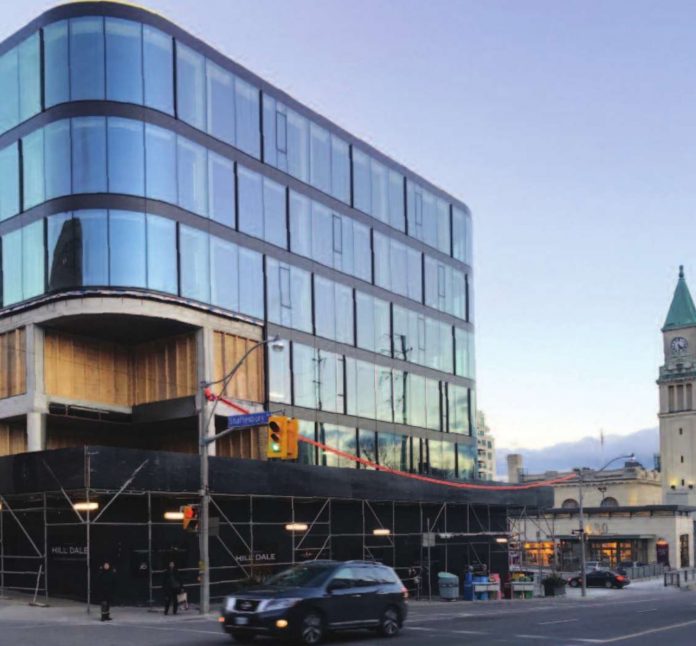Ontario Construction Report special feature
Founded in 2006, Studio JCI began with designs for single-family homes in Toronto and has since grown to include mixed-use, mid-rise developments, multi-unit residential developments, and commercial and office interiors. The studio is currently building two significant projects in mid-town Toronto.
The first, The Hill & Dale, is a mid-rise development at Rosedale Subway Station that JCI founder Jaegap Chung says “breathes new life to an underperforming building by adding new retail, offices and residences.”
Site conditions include an existing concrete and steel structure in conjunction with a complex, new structure and presented challenges in construction sequencing. “Storey-high trusses help transition the residential addition down to the office and commercial levels down below,” he says.
The second project is an extensive renovation that provides a modern update and energy efficiency to an existing office building by introducing a new building envelope and incorporating outdoor amenity spaces for its occupants.
Chung says infrastructure upgrades, along with the sophisticated curtain wall glazing system hung off the existing concrete structure, provides improved thermal comfort and expansive views of the city for tenants. “Retail and restaurant uses on the ground floor bring activity and animation to the street level making this project a great example of building reuse and revitalization.”
Chung said JCI is guided by a desire to produce good work, test creative ideas, and design buildings worthy of pride. “We believe that we can instigate positive change and transformation by bringing design to areas where it is often ignored.”
The team finds opportunities in every project to re-examine conventional solutions. “We evaluate our success based not only the value it creates for our clients, but also on the value it brings to our social and urban environment.”
The studio’s collaborative environment ensures that staff are always learning from fellow colleagues, clients and the broader design community, Chung says. “Regular design charettes create avenues for open dialogue about design and the profession at large. Local and international competitions, as well as research projects, create opportunities to test ideas and engage with the broader architectural community. “
Chung says the culture of open communication and exchange also extends to working relationships with clients and, in particular, developer clients who can often affect meaningful change at the city scale, by offering design and project management services throughout the entire process of planning, development and building. “Together we provide thoughtful design solutions that maximize the projects value to clients while contributing positively to our shared physical environment and experience.”
Innovation, collaboration, and sustainability has always been the company’s focus, going back to its initial speculative housing projects that “challenged the ubiquitous developer home by proposing a coherent, contemporary living environment while incorporating traditional material palettes with standard construction,” he says.
Early projects also include the Shobuj Pata (Bengali for Green Leaf) Community Masterplan which effectively balances density and efficiency with ecological sustainability. Shobuj Pata was recently awarded the 2017 Ontario Association of Architects ‘Concept’ Award.
Studio JCI is a member of the OAA (Ontario Association of Architects) and the RAIC (Royal Architectural Institute of Canada).

